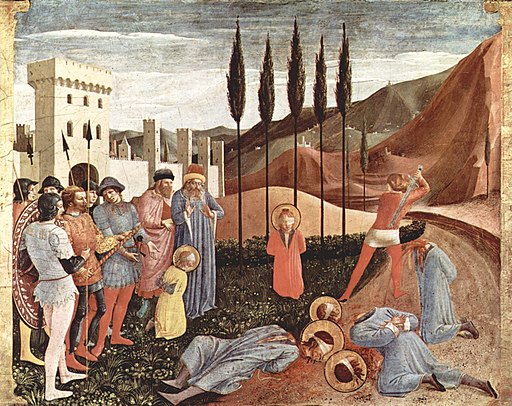
Transfiguration

The Beheading of Saints Cosmas And Damian
Fra Giovanni was a simple man and most holy in his habits, and one day when Pope Nicholas V desired him to dine with him, he had scruples of conscience about eating meat without his prior's leave, not considering the Pope's authority. He would not follow the ways of the world, but lived purely and holily, and was a great friend of the poor. He painted constantly, and would never represent anything but the saints. He might have been rich, but did not care about it, saying that true riches are nothing else than being content with little. He might have governed many, and would not, saying it was less troublesome to obey, and one was less liable to err in obeying. It was in his power to hold dignities among the friars and elsewhere, but he did not esteem them, affirming that he sought no other dignity than to escape hell and attain to Paradise. He was most kind and sober, keeping himself free from all worldly ties, often saying that he who practised art had need of quiet and to be able to live without cares, and that he who represents the things of Christ should always live with Christ. He was never seen in anger by the friars, which is a great thing, and seems to me almost impossible to believe; and he had a way of admonishing his friends with smiles. To those who sought his works he would answer, that they must content the prior, and then he would not fail. To sum up, this father, who can never be enough praised, was in all his works and words most humble and modest, and in his paintings facile and devout; and the saints whom he painted have more the air and likeness of saints than those of any one else. It was his habit never to retouch or alter any of his paintings, but to leave them as they came the first time, believing, as he said, that such was the will of God. Some say he would never take up his pencil until he had first made supplication, and he never made a crucifix but he was bathed in tears.[From Giorgio Vasari's Lives of the Artists]